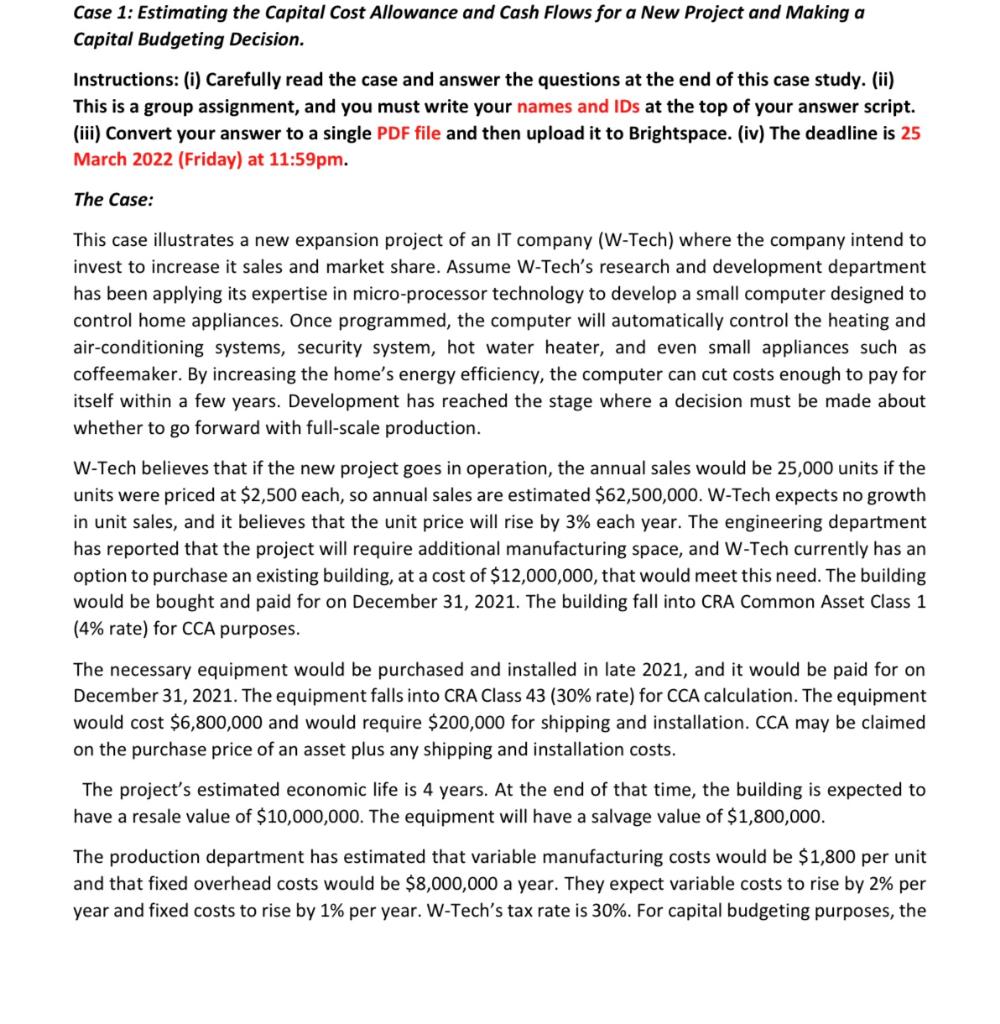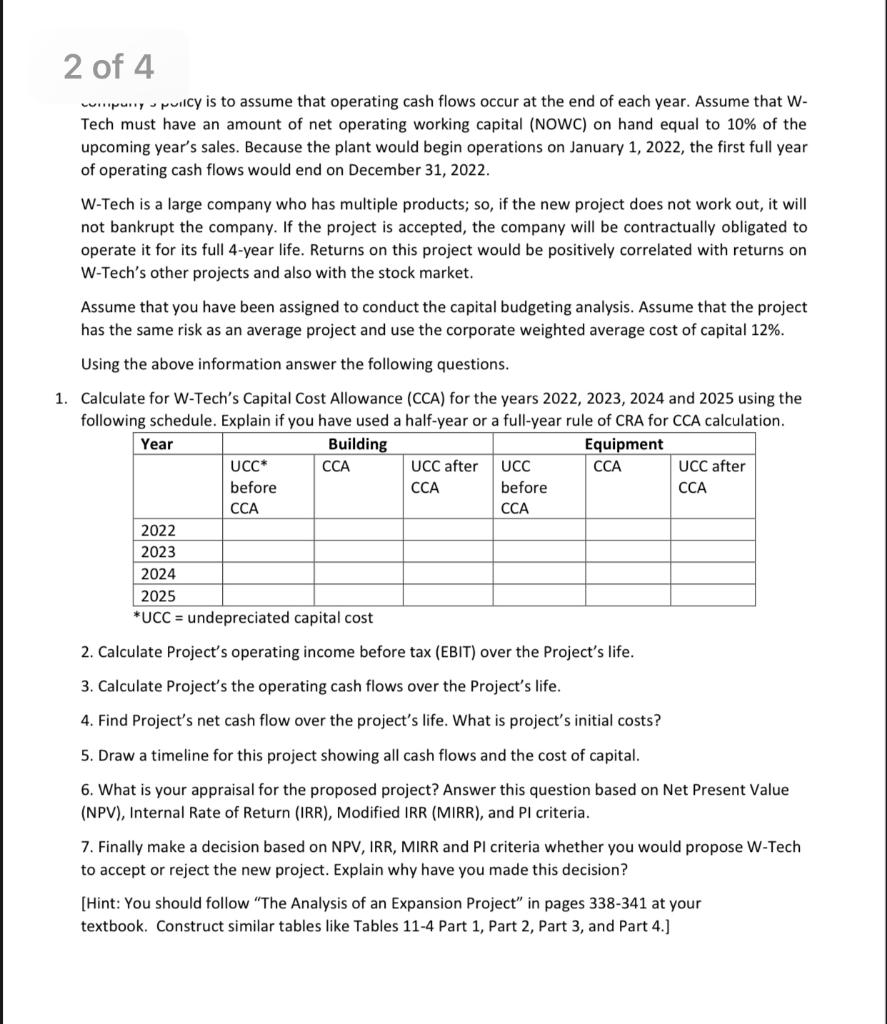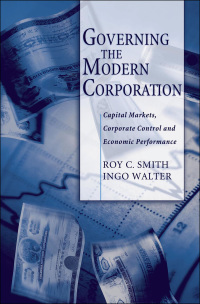

Case 1: Estimating the Capital Cost Allowance and Cash Flows for a New Project and Making a Capital Budgeting Decision. Instructions: (i) Carefully read the case and answer the questions at the end of this case study. (ii) This is a group assignment, and you must write your names and IDs at the top of your answer script. (iii) Convert your answer to a single PDF file and then upload it to Brightspace. (iv) The deadline is 25 March 2022 (Friday) at 11:59pm. The Case: This case illustrates a new expansion project of an IT company (W-Tech) where the company intend to invest to increase it sales and market share. Assume W-Tech's research and development department has been applying its expertise in micro-processor technology to develop a small computer designed to control home appliances. Once programmed, the computer will automatically control the heating and air-conditioning systems, security system, hot water heater, and even small appliances such as coffeemaker. By increasing the home's energy efficiency, the computer can cut costs enough to pay for itself within a few years. Development has reached the stage where a decision must be made about whether to go forward with full-scale production. W-Tech believes that if the new project goes in operation, the annual sales would be 25,000 units if the units were priced at $2,500 each, so annual sales are estimated $62,500,000. W-Tech expects no growth in unit sales, and it believes that the unit price will rise by 3% each year. The engineering department has reported that the project will require additional manufacturing space, and W-Tech currently has an option to purchase an existing building, at a cost of $12,000,000, that would meet this need. The building would be bought and paid for on December 31, 2021. The building fall into CRA Common Asset Class 1 (4% rate) for CCA purposes. The necessary equipment would be purchased and installed in late 2021, and it would be paid for on December 31, 2021. The equipment falls into CRA Class 43 (30% rate) for CCA calculation. The equipment would cost $6,800,000 and would require $200,000 for shipping and installation. CCA may be claimed on the purchase price of an asset plus any shipping and installation costs. The project's estimated economic life is 4 years. At the end of that time, the building is expected to have a resale value of $10,000,000. The equipment will have a salvage value of $1,800,000. The production department has estimated that variable manufacturing costs would be $1,800 per unit and that fixed overhead costs would be $8,000,000 a year. They expect variable costs to rise by 2% per year and fixed costs to rise by 1% per year. W-Tech's tax rate is 30%. For capital budgeting purposes, the 2 of 4 ...y - pucy is to assume that operating cash flows occur at the end of each year. Assume that W- Tech must have an amount of net operating working capital (NOWC) on hand equal to 10% of the upcoming year's sales. Because the plant would begin operations on January 1, 2022, the first full year of operating cash flows would end on December 31, 2022. W-Tech is a large company who has multiple products; so, if the new project does not work out, it will not bankrupt the company. If the project is accepted, the company will be contractually obligated to operate it for its full 4-year life. Returns on this project would be positively correlated with returns on W-Tech's other projects and also with the stock market. Assume that you have been assigned to conduct the capital budgeting analysis. Assume that the project has the same risk as an average project and use the corporate weighted average cost of capital 12%. Using the above information answer the following questions. 1. Calculate for W-Tech's Capital Cost Allowance (CCA) for the years 2022, 2023, 2024 and 2025 using the following schedule. Explain if you have used a half-year or a full-year rule of CRA for CCA calculation. Year Building Equipment UCC* CCA UCC after UCC CCA UCC after before CCA before CCA CCA CCA 2022 2023 2024 2025 *UCC = undepreciated capital cost 2. Calculate Project's operating income before tax (EBIT) over the Project's life. 3. Calculate Project's the operating cash flows over the Project's life. 4. Find Project's net cash flow over the project's life. What is project's initial costs? 5. Draw a timeline for this project showing all cash flows and the cost of capital. 6. What is your appraisal for the proposed project? Answer this question based on Net Present Value (NPV), Internal Rate of Return (IRR), Modified IRR (MIRR), and Pl criteria. 7. Finally make a decision based on NPV, IRR, MIRR and Pl criteria whether you would propose W-Tech to accept or reject the new project. Explain why have you made this decision? [Hint: You should follow "The Analysis of an Expansion Project" in pages 338-341 at your textbook. Construct similar tables like Tables 11-4 Part 1, Part 2, Part 3, and Part 4.] Case 1: Estimating the Capital Cost Allowance and Cash Flows for a New Project and Making a Capital Budgeting Decision. Instructions: (i) Carefully read the case and answer the questions at the end of this case study. (ii) This is a group assignment, and you must write your names and IDs at the top of your answer script. (iii) Convert your answer to a single PDF file and then upload it to Brightspace. (iv) The deadline is 25 March 2022 (Friday) at 11:59pm. The Case: This case illustrates a new expansion project of an IT company (W-Tech) where the company intend to invest to increase it sales and market share. Assume W-Tech's research and development department has been applying its expertise in micro-processor technology to develop a small computer designed to control home appliances. Once programmed, the computer will automatically control the heating and air-conditioning systems, security system, hot water heater, and even small appliances such as coffeemaker. By increasing the home's energy efficiency, the computer can cut costs enough to pay for itself within a few years. Development has reached the stage where a decision must be made about whether to go forward with full-scale production. W-Tech believes that if the new project goes in operation, the annual sales would be 25,000 units if the units were priced at $2,500 each, so annual sales are estimated $62,500,000. W-Tech expects no growth in unit sales, and it believes that the unit price will rise by 3% each year. The engineering department has reported that the project will require additional manufacturing space, and W-Tech currently has an option to purchase an existing building, at a cost of $12,000,000, that would meet this need. The building would be bought and paid for on December 31, 2021. The building fall into CRA Common Asset Class 1 (4% rate) for CCA purposes. The necessary equipment would be purchased and installed in late 2021, and it would be paid for on December 31, 2021. The equipment falls into CRA Class 43 (30% rate) for CCA calculation. The equipment would cost $6,800,000 and would require $200,000 for shipping and installation. CCA may be claimed on the purchase price of an asset plus any shipping and installation costs. The project's estimated economic life is 4 years. At the end of that time, the building is expected to have a resale value of $10,000,000. The equipment will have a salvage value of $1,800,000. The production department has estimated that variable manufacturing costs would be $1,800 per unit and that fixed overhead costs would be $8,000,000 a year. They expect variable costs to rise by 2% per year and fixed costs to rise by 1% per year. W-Tech's tax rate is 30%. For capital budgeting purposes, the 2 of 4 ...y - pucy is to assume that operating cash flows occur at the end of each year. Assume that W- Tech must have an amount of net operating working capital (NOWC) on hand equal to 10% of the upcoming year's sales. Because the plant would begin operations on January 1, 2022, the first full year of operating cash flows would end on December 31, 2022. W-Tech is a large company who has multiple products; so, if the new project does not work out, it will not bankrupt the company. If the project is accepted, the company will be contractually obligated to operate it for its full 4-year life. Returns on this project would be positively correlated with returns on W-Tech's other projects and also with the stock market. Assume that you have been assigned to conduct the capital budgeting analysis. Assume that the project has the same risk as an average project and use the corporate weighted average cost of capital 12%. Using the above information answer the following questions. 1. Calculate for W-Tech's Capital Cost Allowance (CCA) for the years 2022, 2023, 2024 and 2025 using the following schedule. Explain if you have used a half-year or a full-year rule of CRA for CCA calculation. Year Building Equipment UCC* CCA UCC after UCC CCA UCC after before CCA before CCA CCA CCA 2022 2023 2024 2025 *UCC = undepreciated capital cost 2. Calculate Project's operating income before tax (EBIT) over the Project's life. 3. Calculate Project's the operating cash flows over the Project's life. 4. Find Project's net cash flow over the project's life. What is project's initial costs? 5. Draw a timeline for this project showing all cash flows and the cost of capital. 6. What is your appraisal for the proposed project? Answer this question based on Net Present Value (NPV), Internal Rate of Return (IRR), Modified IRR (MIRR), and Pl criteria. 7. Finally make a decision based on NPV, IRR, MIRR and Pl criteria whether you would propose W-Tech to accept or reject the new project. Explain why have you made this decision? [Hint: You should follow "The Analysis of an Expansion Project" in pages 338-341 at your textbook. Construct similar tables like Tables 11-4 Part 1, Part 2, Part 3, and Part 4.]








